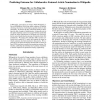Free Online Productivity Tools
i2Speak
i2Symbol
i2OCR
iTex2Img
iWeb2Print
iWeb2Shot
i2Type
iPdf2Split
iPdf2Merge
i2Bopomofo
i2Arabic
i2Style
i2Image
i2PDF
iLatex2Rtf
Sci2ools
ICWSM
2009
2009
Predicting Outcome for Collaborative Featured Article Nomination in Wikipedia
In Wikipedia, good articles are wanted. While Wikipedia relies on collaborative effort from online volunteers for quality checking, the process of selecting top quality articles is time consuming. At present, the duty of decision making is shouldered by only a couple of administrators. Aiming to assist in the quality checking cycles so as to cope with the exponential growth of online contributions to Wikipedia, this work studies the task of predicting the outcome of featured article (FA) nominations. We analyze FA candidate (FAC) sessions collected over a period of 3.5 years, and examine the extent to which consensus has been practised in this process. We explore the use of interaction features between FAC reviewers to learn SVM classifiers to predict the nomination outcome. We find that, calibrating the individual user's polarity of opinions as features improves the prediction accuracy significantly.
| Added | 19 Feb 2011 |
| Updated | 19 Feb 2011 |
| Type | Journal |
| Year | 2009 |
| Where | ICWSM |
| Authors | Meiqun Hu, Ee-Peng Lim, Ramayya Krishnan |
Comments (0)

